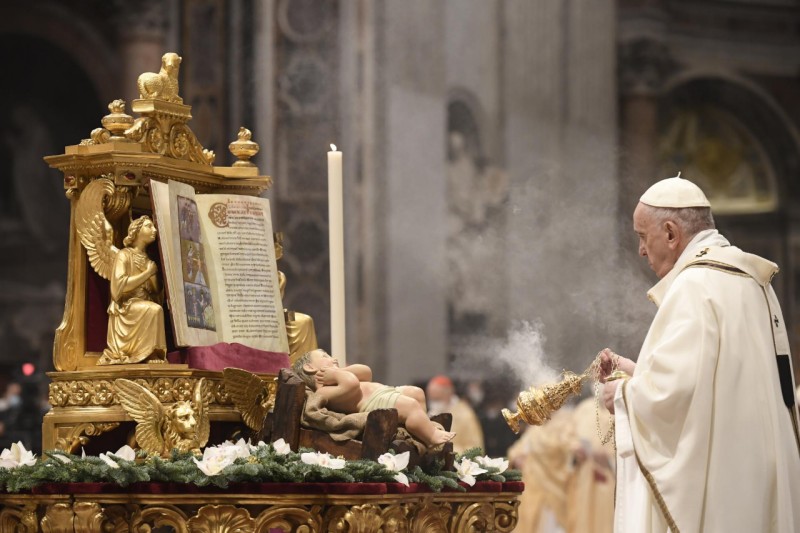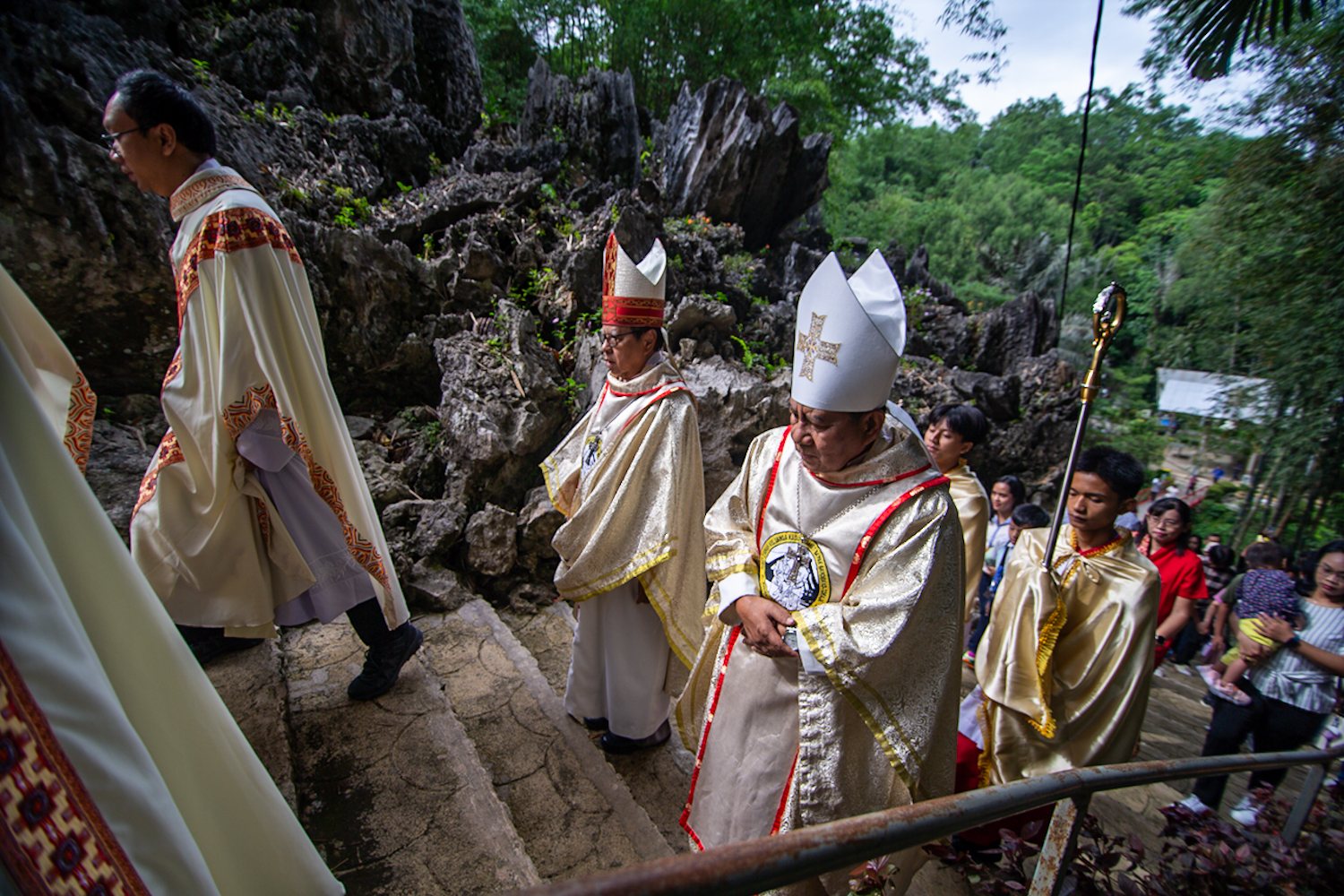Miguel Augusto
Last week on the Solemnity of the Epiphany of the Lord, Pope Francis, in his homily given in Saint Peter’s Basilica, used the example of the Magi to exhort the faithful to a new enthusiasm in the paths of faith. The Wise Men detached themselves from worldly comfort to follow the star that would lead them to the child God who had made Himself present among men. The thought that the Holy Father suggested for the New Year is: ‘re-creating the journey of faith, in a rediscovery of God’s desire.’
For the Pontiff, this pilgrimage of the Magi on their journey to Bethlehem speaks also to us, who are called to journey towards Jesus: “For he is the North Star that lights up the sky of life and guides our steps towards true joy.”
The Holy Father mentioned that the eyes of the Magi were not fixed on things here below; they were windows open to the heavens. He concluded using the words of a homily by Pope Benedict XVI (6 January 2013), who said that the Magi were “Men with a restless heart… They were filled with expectation, not satisfied with their secure income and their respectable place in society… They were seekers after God.”
CULTIVATE THE DESIRE
From the inner impulse that was born in the Magi, Francis asks himself “Where did it originate, this spirit of healthy restlessness that led them to set out on their journey?” He himself gives the answer: “It was born of desire. That was their secret: the capacity to desire. Let us think about this.” The Pope explained that to desire means to fuel the fire that burns within us; it drives us to look beyond what is immediate and visible “since life is not just our here and now, but something much greater.” In the desire to delve into the mystery of life, he adds, “It is like a blank canvas that cries out for color. A great painter, Vincent Van Gogh, once said that his need for God drove him to go outside at night to paint the stars.“
CRISIS OF FAITH
For Pope Francis, the crisis of faith in our lives and in our societies also has to do with the eclipse of desire for God. And so that each one can evaluate himself, he suggested: “Let us look first to ourselves and ask: How is the journey of my faith going? This is a question that we can ask ourselves today, each one of us… Is it parked or is it on the move? Faith, if it is to grow, has to begin ever anew. It needs to be sparked by desire.”
Having returned to the example of the Magi, the Holy Father mentioned that at the end of the Magi’s journey came the climactic moment: once they arrived at their destination, “they fell down and worshiped the Child” (Matthew 2:11). And here reinforces “They worshiped. Let us never forget this: the journey of faith finds renewed strength and fulfilment only when it is made in the presence of God. Only if we recover our ‘taste’ for adoration will our desire be rekindled. Desire leads us to adoration and adoration renews our desire. For our desire for God can only grow when we place ourselves in his presence.”
In his message, he asked that we should not neglect adoration, “that prayer of silent adoration which is not so common among us. Please let us not forget adoration.”
In the spiritual “recipe” that Francis prescribed, “we will have the daily certainty that even in the darkest nights a star continues to shine. It is the star of the Lord, who comes to care for our frail humanity.”
The Pope also asked to let our restless hearts embrace the restlessness of the Spirit – “The world expects from believers a new burst of enthusiasm for the things of heaven.”
WHAT IS FAITH?
At a general audience at Saint Peter’s Square on October 24, 2012, Benedict XVI said that with the beginning of the Year of Faith (2012-2013), he was starting a new series of catecheses on faith. Early on these reflections, the Pope expressed a wish and posed a question of profound timeless relevance: “I would like to reflect with you on a fundamental question: What is faith? Does faith still make sense in a world in which science and technology have unfolded horizons unthinkable until a short time ago? What does believing mean today?” In a ‘today’ that for the Pope “together with so many signs of goodness a certain spiritual desert is also developing around us.”
In his reflection, the Pope mentioned that in this context certain fundamental questions reemerge that are far weightier than they seem at first sight: “What is life’s meaning? Is there a future for humanity, for us and for the generations to come? In which direction should we orient our free decisions for a good and successful outcome in life? What awaits us beyond the threshold of death?”
For Benedict XVI faith gives us precisely this: “it is a confident entrustment to a ‘You’, who is God, who gives me a different certitude, but no less solid than that which comes from precise calculation or from science. Faith is not a mere intellectual assent of the human person to specific truths about God; it is an act with which I entrust myself freely to a God who is Father and who loves me; it is adherence to a ‘You’ who gives me hope and trust… with the attitude of a child, who knows well that all his difficulties, all his problems are understood in the ‘you’ of his mother.”
On the other hand, the Pope also explained that faith is a gift of God, but it is also a profoundly free and human act. At this point of the reflection, he quotes the Catechism of the Catholic Church (CCC) that says clearly: “Believing is possible only by grace and the interior help of the Holy Spirit. But it is no less true that believing is an authentically human act… contrary neither to human freedom nor to human reason” (CCC 154). And he add “Indeed, it involves them and uplifts them in a gamble for life that is like an exodus, that is, a coming out of ourselves, from our own certainties, from our own mental framework, to entrust ourselves to the action of God who points out to us his way to achieve true freedom, our human identity, true joy of the heart, peace with everyone.”
The Holy Father concludes that faith, then, is an assent with which our mind and our heart say their ‘yes’ to God, confessing that Jesus is Lord. And this ‘yes’ “transforms life, unfolds the path toward fullness of meaning, thereby making it new, rich in joy and trustworthy hope.”
The Pope left an appeal that is always timely: “Dear friends, our time needs Christians who have been grasped by Christ, who grow in faith through their familiarity with Sacred Scripture and the sacraments. People who are, as it were, an open book that tells of the experience of new life in the Spirit, of the presence of that God who supports us on our way and opens us to everlasting life.”
(Image: Pope Francis, Solemnity of the Epiphany of the Lord, Holy Mass. © Dicastero per la Comunicazione – Libreria Editrice Vaticana)


 Follow
Follow


